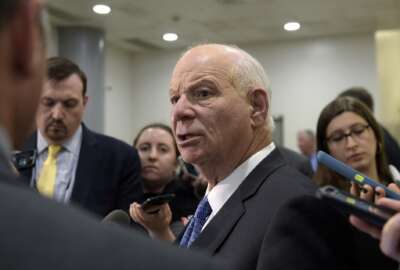
Kaspersky Lab challenging Congress’ ban on its products
In today's Federal Newscast, the Russian based federal contractor said the provision in the 2018 National Defense Authorization Act banning it from federal networks...
To listen to the Federal Newscast on your phone or mobile device, subscribe on PodcastOne or iTunes.
- A federal contractor facing a governmentwide ban is taking its case to court. Kaspersky Lab filed a second lawsuit in district court this time to overturn a congressionally-mandated ban of its software and services. Kaspersky already filed suit in December against the Department of Homeland Security’s policy directive from last fall that required agencies to remove the company’s products from federal networks. Kaspersky Lab has now said the provision in the 2018 Defense Authorization bill banning it from federal networks is unconstitutional. The company asked the court to stop the implementation of ban, which is expected to start in October.
- Seven agencies will hire more people under the president’s 2019 budget, but most others will continue the workforce reductions they started in 2017 and 2018. The Commerce, Homeland Security, and Veterans Affairs Departments will see big hiring boosts next year. The Agriculture Housing and Urban Development and the Environmental Protection Agency (EPA) will continue to see big staffing cuts. The overall size of the federal workforce is expected to increase, though, both this year and in 2019. (Federal News Radio)
- President Donald Trump’s fiscal 2019 budget proposal would give more money for the IRS to go after tax cheats, but would also cut thousands of taxpayer services jobs. Under the plan, the IRS would cut more than 4,000 staff from roles that include answering taxpayer questions over the phone. (Federal News Radio)
- President Trump’s budget also proposes cutting funds at the National Institutes of Standards and Technology by more than a third in fiscal 2019, for a budget of $629 million. NIST would lose nearly 400 employees, about 15% of its total workforce. (Federal News Radio)
- EPA plans to cut more regional offices in order to reduce its office space. EPA officials told Federal News Radio that the agency will close the Large Lakes Research Station in Grosse, Michigan before the end of June. EPA will relocate employees near the site of its vehicle emission testing facility in Anne Arbor, Michigan. The agency plans to award a contract for pre-manufactured office buildings for EPA employees to relocate to by early March.
- The Office of Personnel Management released its new strategic plan for the next four years. The agency wants to transform hiring, pay and benefits across government. OPM said it will also implement the Employee Digital Record application and standards by the end of 2019. It will allow employees to transfer all their paperwork and documentation between agencies. (Office of Personnel Management)
- Allison Brigati goes from acting to permanent deputy administrator at the General Services Administration. She had been in an acting role since December after joining GSA in July as its associate administrator of the Office of Governmentwide Policy. Before that, she was general counsel and director of strategic initiatives for the National Academy of Public Administration. (General Services Administration)
- Kevin Fahey has been approved as the Department of Defense’s assistant secretary for acquisition by the Senate Armed Services Committee. Fahey previously worked as vice president of combat vehicles and armaments at Cypress International. Prior to that, he worked at the office of the assistant secretary of the Army for acquisition, logistics and technology as executive director of systems engineering and integration.
- The White House named the next commander of U.S. Cyber Command. President Trump nominated Army Lt. Gen. Paul Nakasone for promotion to the rank of General late last week, a necessary prerequisite to take the post. But Rob Joyce, the White House cybersecurity coordinator, announced in a tweet yesterday that Nakasone will indeed be the next commander of CYBERCOM and director of the National Security Agency, pending Senate confirmation. Nakasone currently serves as commander of Army Cyber Command. Before that, he commanded USCYBERCOM’s National Mission Force. (Rob Joyce Twitter)
- The Coast Guard will get its first new heavy icebreaker in forty years if Congress funds the president’s 2019 budget request. The service is asking for nearly $12 billion in the next budget, an increase of almost $1 billion. Last year, the Trump administration considered cutting the Coast Guard’s budget by $1.3 billion.
- It’s that time of year again … to nominate worthy career public servants for the highest recognision awards. Nominations for presidental rank awarees are due Friday, March 30. Since 1978, the yearly program honors about 150 of the top performing senior executives, professionals and scientists. High-impact executives among the offices of inspector general are also eligible. The Office of Personnel Management tells agency heads they may nominate up to nine percent of their senior staffs. (Chief Human Capital Officers Council)
Copyright © 2025 Federal News Network. All rights reserved. This website is not intended for users located within the European Economic Area.
Eric White
Eric White is news anchor and Federal Drive producer at Federal News Network.
Follow @FEDERALNEWSCAST
Related Stories
AP/Jacquelyn Martin

OPM lays out strategies for agencies to implement Trump administration’s priorities
Related Topics




